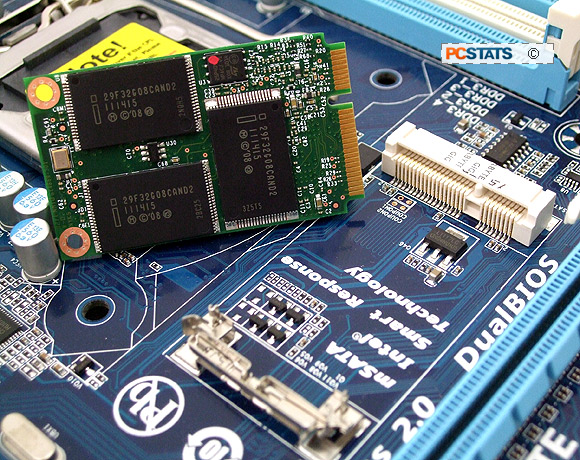The
following benchmark table offers direct comparisons using the Gigabyte
GA-Z68XP-UD3-iSSD test system with Windows 7 installed to an OCZ SSD, a Western
Digital Raptor hard drive, and to the Raptor HDD with Intel SRT enabled on the
bundled in Intel 20GB mSATA SSD.
While
testing out Intel SRT PCSTATS noticed that it consistently takes at least
two iterations to kick in,
the first run being slightly faster than the native-HDD configuration. Generally
speaking, by the second iteration the performance advantage from Intel SRT is
about 4/5ths that of an SSD.
Test Description:
SSD: Win7
system running off the OCZ Vertex 2 solid
state drive.
HDD:
Win7 system running off the Western Digital
WD740 hard drive.
HDD + Cache SSD (Enhanced): Win7 system running off
the Western Digital WD740 hard drive with a
20GB Intel 311 mSATA SSD configured via
Intel SRT to Enhanced mode.
 Futuremark PCMark
Vantage Futuremark PCMark
Vantage |
| Overall: |
Points |
Ranking |
 SSD SSD |
15863 |
   |
| HDD |
9850 |
   |
| HDD + Cache SSD (Enhanced) RUN 1 |
10812 |
   |
| HDD + Cache SSD (Enhanced) RUN 2 |
14028 |
   |
| Memory: |
Points |
Ranking |
 SSD SSD |
11010 |
   |
| HDD |
7365 |
   |
| HDD + Cache SSD (Enhanced) RUN 1 |
8827 |
   |
| HDD + Cache SSD (Enhanced) RUN 2 |
9292 |
   |
| TV and Movies: |
Points |
Ranking |
 SSD SSD |
6549 |
   |
| HDD |
5445 |
   |
| HDD + Cache SSD (Enhanced) RUN 1 |
5983 |
   |
| HDD + Cache SSD (Enhanced) RUN 2 |
5848 |
   |
| Gaming: |
Points |
Ranking |
 SSD SSD |
15882 |
   |
| HDD |
7811 |
   |
| HDD + Cache SSD (Enhanced) RUN 1 |
14483 |
   |
| HDD + Cache SSD (Enhanced) RUN 2 |
14605 |
   |
| Music: |
Points |
Ranking |
 SSD SSD |
17697 |
   |
| HDD |
9143 |
   |
| HDD + Cache SSD (Enhanced) RUN 1 |
15152 |
   |
| HDD + Cache SSD (Enhanced) RUN 2 |
13568 |
   |
| Communications: |
Points |
Ranking |
 SSD SSD |
15873 |
   |
| HDD |
11887 |
   |
| HDD + Cache SSD (Enhanced) RUN 1 |
14779 |
   |
| HDD + Cache SSD (Enhanced) RUN 2 |
13949 |
   |
| Productivity: |
Points |
Ranking |
 SSD SSD |
18955 |
   |
| HDD |
7242 |
   |
| HDD + Cache SSD (Enhanced) RUN 1 |
12827 |
   |
| HDD + Cache SSD (Enhanced) RUN 2 |
14952 |
   |
| HDD: |
Points |
Ranking |
 SSD SSD |
32833 |
   |
| HDD |
4501 |
   |
| HDD + Cache SSD (Enhanced) RUN 1 |
17052 |
   |
| HDD + Cache SSD (Enhanced) RUN 2 |
16562 |
   | |
PCMark Vantage yields pretty clear results; quickest is
the PC with Windows 7 installed directly to the SSD and slowest is the PC with
Win 7 installed to the HDD. No big surprise there, still, these two tests form
the reference points from which to judge Intel SRT's impact when frequently
accessed data blocks are read directly off the SSD cache, bypassing the hard
disk entirely.

As you can see in the Vantage results chart above, the
first run with Intel SRT enabled demonstrates better results than the pure HDD
scenario, but generally speaking the second run offers the nearest to like-SSD
performance. PCSTATS' expanded look at Intel Smart Response Technology dives
into what it can and cannot improve, in greater depth. Generally
speaking, applications that aren't storage intensive see much less of a positive
impact.
Is it any good? Certainly! If you're putting together a
PC system built around a mechanical hard drive, adding Intel Smart Response
Technology into the mix via Gigabyte's GA-Z68XP-UD3-iSSD motherboard and the
bundled in 20GB SSD cache is a worthwhile measure that can yield speed benefits
to data intensive applications.
Next up, Sysmark 2007 benchmark results.
